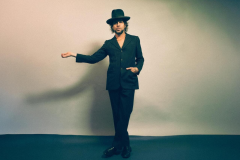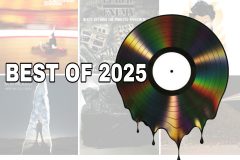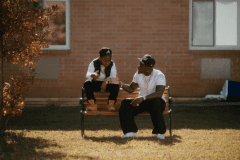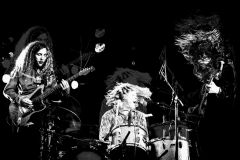Toronto’s Fucked Up have made probably their most epic album to date. For those familiar with the band that may seem like a tall order, as they are known for pushing the boundaries of punk rock and making their sound bigger and more layered with each new record. Their latest album Dose Your Dreams (the band’s first proper release on Merge Records) continues with many lyrical themes from their past releases; we see the return of The Life Of David’s titular character who on a life changing journey. Musically it takes the boundary pushing to new heights, with a few songs going full on electronic and yet sounds as much like a Fucked Up record as you would imagine. I had the privilege of talking about the process of making Dose Your Dreams with guitarist/vocalist Mike Haliechuck and drummer Jonah Falco.
GhettoBlaster: Musically this album is unlike anything you’ve done before. What were some of the initial ideas that went into creating this album and how did it grow from there?
Mike Haliechuck: All I knew when we went into the studio was that I wanted to incorporate more electronic shit into the sounds, because I’d been experimenting a lot making some dance stuff in the years prior. The first things we really reached for this time were the drum machines and the trumpets. The first sound that we recorded that made it onto the record was the kick intro from “Accelerate”, which was just Jonah checking the drums for sound. Originally we had this idea of doing one electro/punk/industrial side, and then the other side of the album that was more traditional Fucked Up, in the stadium-crust aesthetic. But, we kinda ran out of hard songs and then cut a few more. Then like a year later we ended up with a solid plan for Dose Your Dreams.
Jonah Falco: I think we tried to extend what we saw as the traditional “Fucked Up” sound – mid tempo punk with big melodies and the right touch of cynical aggression – without retreading something we’d done already. Like Mike said, as “Accelerate” started to form we saw this new horizon of glitchy almost electronic Fucked Up. We had crushed and processed drums and synths blended with these joyous melodies that, in our former selves, would have strictly originated in the stylistic decisions of the undertones.
GB: There are so many different layers and instruments and different vocalists on each song. Not to mention several members switching roles and bringing in guest musicians. Was there a particular thought process in putting all of those things together or did it all happen organically?
MH: I mean we kind of always do that. I like to have as much stuff in each song as possible. The most amount of words, tracks, singers, instruments, sounds, etc. I want Fucked Up songs to be like Marvel movies. I want them to have too much stuff to even make sense of the first few times you listen, so that you must unravel everything to truly make sense of what we put in. But we’re telling stories, so it makes sense. You want things to come from different voices and different instruments. Once we realized what kind of album we were making and Damian clarified what kind of role he wanted to have in the process, we just let everything get as loose as we could. I sang, Jonah did acapella songs, we just tried to make it as weird as possible. Kind of like some janky community theater thing where you invite your uncle to be in the play. Nothing on this record was planned out in advance, it just kept building and adding.
JF: Fucked Up is always defined by what it isn’t for us — melodic music vs harsh vocals, thoughtful concepts, artwork, content vs a silly band name, and so on. So from day one we’ve had this obsession with bringing outside influence directly in to the band. It makes what we do more interesting to have the constant contradictions in our sound, right down to implementing the “wrong” voices over our songs. Fucked Up always feels like some kind of department store desperately trying to stock *everything* a person could need under one roof. We nudge closer to that with every record.
GB: Is that something you’ve thought about recreating live?
MH: Yeah, we played our first Dose Your Dreams show last week and did like 10 new songs. Obviously we’re not gonna travel with a caravan of back up singers and sax players. We’re gonna translate the songs into things that belong in a Fucked Up live set, which is something much different than what we do on our albums.
JF: This actually feels like the first opportunity to really meet the challenge of interpreting and recreating a record we’ve made. All the other songs we’ve written kind of easily translate to the stage. There was nothing to interpret to make them live songs other than possibly struggling to recreate the depth of having the ability to multitrack. With this record it feels like there’s the record, and there’s the show. Both require a massive amount of attention and elemental focus to pull off. We do what we can to make the show feel like the record and dutifully interpret it.
GB: Once the record was completed, what was the most significant thing you took away from it?
MH: I put more of myself into this, told myself I could tell a story on my own, and actually put my voice on it.
JF: Dose Your Dreams has felt the most fully formed and fully realized Fucked Up record we’ve done. Whenever I hear our old records I can immediately tell it’s “me” or “us” playing a song. I never felt that separation from anything I’ve recorded before. When Mike was sending me final mixes of “Normal People” I had to stop and remember that it was actually he and I performing this music. It sounded like a real record.
GB: The story in this album continues from themes and characters from your other records. In what ways do they connect?
JF: This is just the continuation of using a character as a conduit to tell a story. Rather than try and express your feelings directly to the listener, you project your thought process on to a third party so that person can embed the totality of your fears, successes, desires, failures, confusion etc. It cuts a little less deep in to what you’re made of to have someone else act as your avatar. It’s easier to control yourself when you do so from outside your body. That’s how these themes and characters connect to the rest of our catalogue.
GB: Do you feel that even after Dose Your Dreams there is more of that story to tell?
MH: Of course, there is always lots more to say and more reasons to connect.
GB: What are you hoping listeners will take away from this album?
JF: Hopefully a few melodies, a happy tear, and a very cool large format printed lyric poster.
Facebook | Instagram | Twitter | Website
Photo: John Londono







Social Media